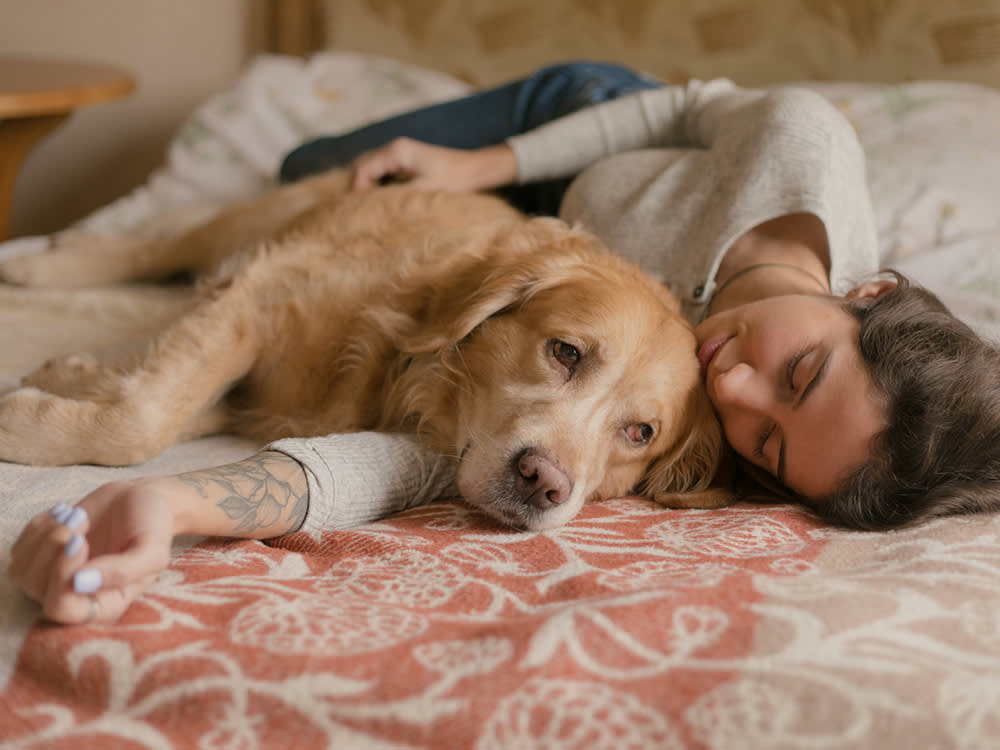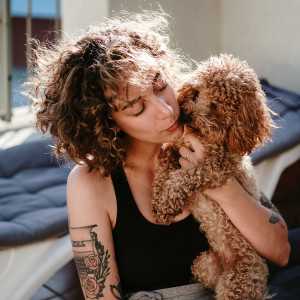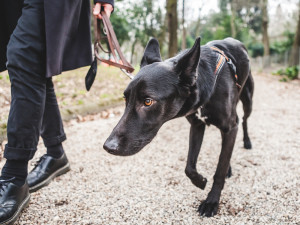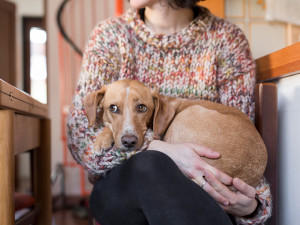Does Your Dog Need Anti-Anxiety Meds?
How to cope with dog anxiety – from training to medication

Share Article
The importance of protecting our mental health has gotten a lot of press in recent years, thanks (and no thanks) to a global pandemic, and all the nerves and isolation that came with it. But humans aren’t the only ones who need to protect our mental wellbeing; our pups can experience anxiety, too. Their lives might look cushy to us (they don‘t have bills, after all), but trauma, lack of socialisation and just plain-old noisy thunder can have real effects on your dog’s psyche.
So, how can you help your dog with their anxietyopens in a new tab? We asked a few veterinarians how they diagnose anxiety in animals, what behavioural changes pet parents should make first and when it’s time to think about prescribing medication.

littleKin™ is Kinship’s home just for puppy and kitten parents. Bop over to check out expert advice, new pet tools, and special deals—all curated for your newest family member.
opens in a new tabSigns of depression or anxiety
Depression in dogs often mimics that in humans: they will act withdrawn or isolate themselves, they’ll lose interest in activities they usually love and there will be changes in their appetiteopens in a new tab or sleeping habitsopens in a new tab.
On the other hand, unaccountable aggression, accidents in the house despite being toilet trained and other destructive behaviours all point to anxiety. “There are a number of behaviours a pet parent may see, including pacing, excessive panting, trembling, whining or vocalising, holding the tail down and lickingopens in a new tab parts of the body excessively, such as the front paws,” says vet Dr John Iovino. “There can be many other odd behaviours that don’t fit the normal, which can also allude to potential anxiety, such as escapist behaviour.”
These signs can signal a medical condition, so if your dog isn’t acting like themselves, the first step is to get a full check-up at your vet to check for any underlying causes. Until then, don’t try to snap your pet out of their sulk when they could be suffering from arthritisopens in a new tab or an illness. Once your vet rules out health issues and injuries, you can take anxiety or depression into account.
Common causes of anxiety
Does your pet go wild when you leave them alone, chewing everything from wires to the wall from stress? Or does the sound of a car backfiring or fireworks leave them cowering in a corner, unable to shake the fear? A 2020 studyopens in a new tab found that 72 percent of dogs suffer from anxiety – with separation, fear of strangers and sensitivity to noiseopens in a new tab to blame for most of the cases (same, dogs, same).
“One common reason for anxiety is lack of socialisation as dogs grow and develop,” adds Dr Iovino. “The more events and experiences a dog can have, the calmer they can be when challenged with negative experiences. In addition, dogs can develop fear or anxiety towards other dogs if they have a bad experience such as getting into a fight with another dog.”
Other causes include “separation anxiety, noise phobias and sometimes even items of clothing, like a hat”, adds vet Dr Seth Vredenburg. “There are so many things that our dogs may see as strange or unusual that can cause some level of anxiety. How we react to these things may influence our dog’s reaction.”
Training before medicating
Dr Sara Ochoa, a vet at Whitehouse Veterinary Hospital in Texas, USA, recommends making behavioural changes before resorting to medication. “For separation anxiety start by training your dog to learn to stay home alone. This usually starts with leaving for a few minutes at a time, then coming right back inside,” she says. Going forwards, don’t make a big deal when you leave the house and slowly increase your time away as your dog gets more comfortable. And if you come home and they haven’t been destructive, reward them with praise and a treat.
For situational anxiety, removing your dog from what’s triggering them may seem like an obvious solution. But if the phobia is unavoidable – like fireworks – a Thundershirt or calming pheromones such as Adaptil can alleviate some anxiety. “Long term, what will mostly help calm a dog down during anxious events is working diligently to desensitise them to this fear through training techniques,” says Dr Iovino. “This process can take weeks to months before you see less anxiety.”
When anxiety meds can help dogs
Does your dog need anxiety meds? Anti-anxiety medication can put your dog in a calmer state of mind so that they’re able to better absorb the training, but medication isn’t a cure-all. If you don’t have a lot of dog training experience, it’s probably a good idea to hire a professional behaviourist. “Just putting your pet on medication isn’t enough – you have to change their behaviour as well – but it can help,” says Dr Ashley Rossman, a vet at Glen Oak Dog and Cat Hospitalopens in a new tab in Illinois, USA.
Which drug is right for your pet depends on the situation and their symptoms. Your vet will consider dog anxiety medications that have been approved by the Medicines and Healthcare products Regulatory Agency (MHRA) for use in dogs, such as Fluoxetine, Dexmedetomidine (Sileo), Trazodone, Clomipramine, Selegiline, Alprazolam, Diazepam and Gabapentin. Your vet will be able to assess if your pup needs ongoing medication or intermittent medication (for a specific event or occasion) as well as dosage. “Some dogs also need a calming medication when they go to the vet or groomer,” adds Dr Ochoa.
Depression in dogs is less common, and thus less often treated medically. But big changes in the household – from the addition of a new pet to the loss of another petopens in a new tab – can cause a dog to become despondent. Unlike us, pets usually bounce back quickly from depressive episodes, and rewarding happy behaviour like playfulness and a wagging tail will hasten the healing process. If their mood doesn’t lighten, a vet may prescribe medication as a temporary measure to take the edge off.
Long-term treatment
Anti-anxiety medications are regulated by the MHRA and generally well-tolerated by humans and animals alike, but all medication requires monitoring. “I like to check blood tests at least once a year when dogs are on it,” says Dr Rossman. It isn’t a quick fix either. Some dogs will need anxiety medication for the rest of their lives, while others can be weaned off it if they respond to training.
Ultimately, it depends on the individual dog and the severity of their behaviour. “Sometimes it takes a couple of weeks to hit a steady-state level, so dogs are normally medicated for at least a few months to get a feeling for how it’s working. It’s a long-term commitment,” adds Dr Rossman.
This information is not meant to be a substitute for veterinary care. Always follow the instructions provided by your vet.

Colleen Stinchcombe
Colleen Stinchcombe lives near Seattle, WA, where she works as a writer, editor, and content strategist. Her two rescue pups wish she were a professional ball-thrower.
Related articles
 opens in a new tab
opens in a new tabHow Deep Is the Love For Our Dogs?
The connection between people and dogs is the stuff of legends
 opens in a new tab
opens in a new tabHow to Get a Dog to Eat
You can’t appease a picky dog with chicken nuggets like you can with a toddler. Here are some things you can do
 opens in a new tab
opens in a new tabOverexcited Dog? How to Calm A Dog Down
If your dog loses their sh*t over anything from a squirrel to a visitor, dog behaviourist Trish King has some tips
 opens in a new tab
opens in a new tabHow to Keep Your Dog From Freaking Out When You Have Company
Do these things to help your pup (and your guests) feel chill



